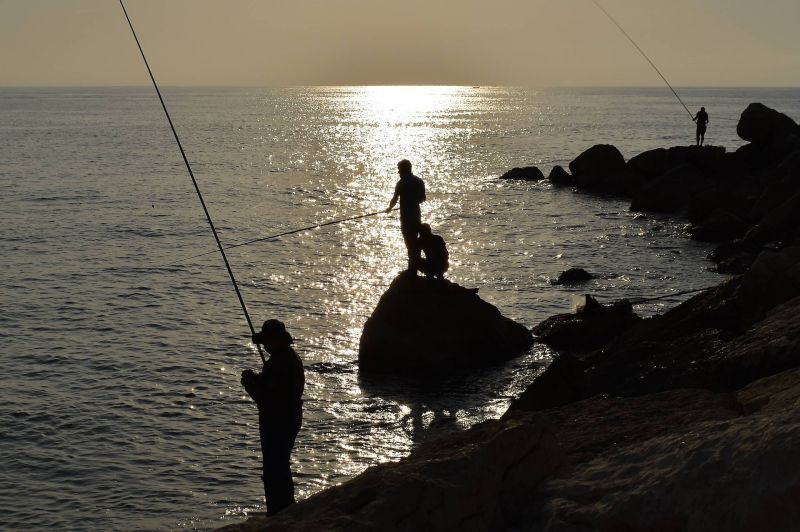
People cast fishing lines of the coast of Lebanon. (Credit: João Sousa/L'Orient Today/File photo)
As the COP28 in Dubai concluded last week with promising notes for some, and mixed feelings for others, climate change is palpable in the Mediterranean, starkly in the east, in Lebanon.
In 2020, the MedECC (Mediterranean Experts on Climate and Environmental Change) published its Report on Climate Change in the Mediterranean, which remains the most comprehensive on the issue. Joël Guiot, an expert in paleoclimatology and research director at the European Center for Research and Teaching in Environmental Geosciences at Aix-Marseille University, is one of the authors. He detailed for L'Orient-Le Jour (L’OLJ) the dramatic current and future consequences of global warming in this region.
L’OLJ: What are the already visible consequences of climate change in the Mediterranean?
Guiot: The Mediterranean Sea is warming faster than the oceans. The rise in temperatures in the Mediterranean basin has reached 1.5 to 1.8 degrees more than the pre-industrial era [about two centuries ago], at a time when global warming is 1.1 degrees. There have been instances where sea surface temperatures reached 30 degrees [in the summer], which is significant. This warming leads to problems with marine biodiversity: Some corals in the Mediterranean struggle to survive, as well as fish and other marine organisms.
Climate change in the Mediterranean also has an impact on the water system. When air masses come from the south and cross the Mediterranean, they are loaded with moisture and cause much higher precipitation, leading to a risk of floods. A notable example is the catastrophe that devastated the Libyan city of Derna in September 2023, exacerbated by the rupture of two dams. The risk of floods is increased because the increasingly intense and short autumn rains fall on very dry soil and do not infiltrate.
What are the worst-case scenarios to expect in the Mediterranean?
In the MedECC report, we used scenarios from the Intergovernmental Panel on Climate Change (IPCC, a UN body and the highest scientific authority in the field). These scenarios range from the most optimistic, limiting the increase to less than two degrees compared to the pre-industrial era in line with the 2015 Paris Agreement, to much more pessimistic scenarios, reaching 6 degrees or more.
Given that greenhouse gas emissions continue to increase worldwide, it is likely that one of the intermediate scenarios, around three degrees more by the end of the 21st century, could be envisaged if countries adhere to their current reduction commitments. A scenario that remains catastrophic for the eastern Mediterranean in particular, with insurmountable water problems, changes in marine and terrestrial ecosystems and sea level rise.

The expert Joël Guiot specializes in paleoclimatology, the discipline that studies past climate changes. According to him, past levels of warming in the Mediterranean cannot be compared with the current one, which is likely to be much greater. (Credit: Union for the Mediterranean)
This last point is crucial, as Mediterranean cities, including those in Lebanon, are built by the sea, whose level has already risen by about 20 cm since the beginning of the century and could reach 50 cm at best, one meter at worst. This means flooded neighborhoods at times or continuously, depending on storms blowing from the sea inland.
Should regional Mediterranean solutions be considered for better adaptation to these scenarios?
The region has interesting potential, particularly concerning the use of renewable energy. Energy transition is more advanced in the north than in the south, requiring more advanced technological and financial cooperation.
In countries like Lebanon, cities need to be greened, and water points should be created to make temperatures more bearable. The coastline should be less impermeable [reduce sealed surfaces like asphalt, etc.] However, these are costly measures. As Mediterranean countries face quite similar issues, it would be desirable to create a bloc in future global events such as climate COPs to push for measures beneficial to this region.
This article was originally published by L'Orient-Le Jour. Translated and edited by Yara Malka.